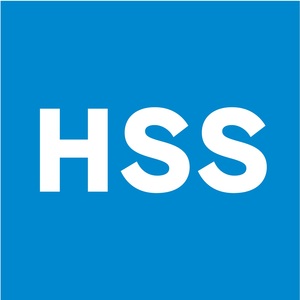NEW YORK, Nov. 7, 2020 /PRNewswire/ -- A knowledgeable patient is an empowered patient, and the ability to understand and proactively manage a health challenge can help improve quality of life, according to Robyn Wiesel, associate director of Public & Patient Education at Hospital for Special Surgery (HSS). However, the community health needs assessment conducted by HSS shows that many people lack confidence and are unaware of educational programs that could help them manage osteoarthritis, rheumatoid arthritis, osteoporosis or another musculoskeletal condition.
Ms. Wiesel and colleagues at HSS set out to change that by expanding virtual health education and support programs. They also launched a targeted marketing campaign to reach groups that would benefit from the offerings.
Ms. Wiesel and Bertilia Trieu, senior outcomes coordinator at HSS, shared successful strategies for developing and implementing self-management programs for people with rheumatic conditions at the virtual annual meeting of the American College of Rheumatology on November 7.
Community-based participatory research (CBPR) was key, according to Ms. Wiesel. "This approach entails conducting a community health needs assessment, prioritizing the health needs of our patients, implementing effective programming, identifying relevant outcome measures and raising patient awareness of our programs," she explains. "The communities we serve are diverse culturally, geographically and economically, as well as in their medical needs."
Once information was gathered and needs were assessed, the HSS education team set to work. For example, the health needs assessment found that two-thirds of respondents had never tried complementary treatments to help manage pain, such as meditation, yoga or mindful breathing. "To address this, we developed a program that offers online lectures on pain and stress management and on-demand YouTube meditation videos," Ms. Trieu explains. "To reach communities that may not have access to the internet, weekly phone-based mindful breathing and meditation workshops are offered."
During the start of the pandemic, HSS programs and classes that previously took place in person were transitioned to virtual offerings. Many new programs were developed, as well. Open to the public, with many free of charge, the online classes, live webinars, informational conference calls and on-demand videos seek to help individuals take more control over their health, develop good habits and feel better.
The HSS Education Institute distributes online surveys with each program to assess its impact and identify areas for improvement. "The programs have been very well-received, with participants noting ease of access and improvements in their physical and mental health," says Ms. Trieu.
Through the virtual program offerings, HSS has extended its reach nationally by over 1,500% compared to 2019 and continues to target new markets via email, social media and ad campaigns, according to Ms. Wiesel. "In addition to helping participants manage their health concerns, the programs help them stay socially connected during these challenging times, which is essential," she said. "Our goal is to continue to develop and implement programs that will improve quality of life for people with rheumatic conditions. We believe they have made a positive impact in the communities we serve."
To learn more about educational programs that HSS offers, visit:
About HSS
HSS is the world's leading academic medical center focused on musculoskeletal health. At its core is Hospital for Special Surgery, nationally ranked No. 1 in orthopedics (for the 11th consecutive year), No. 4 in rheumatology by U.S. News & World Report (2020-2021), and named a leader in pediatric orthopedics by U.S. News & World Report "Best Children's Hospitals" list (2020-2021). Founded in 1863, the Hospital has the lowest complication and readmission rates in the nation for orthopedics, and among the lowest infection rates. HSS was the first in New York State to receive Magnet Recognition for Excellence in Nursing Service from the American Nurses Credentialing Center four consecutive times. The global standard total knee replacement was developed at HSS in 1969. An affiliate of Weill Cornell Medical College, HSS has a main campus in New York City and facilities in New Jersey, Connecticut and in the Long Island and Westchester County regions of New York State, as well as in Florida. In addition to patient care, HSS leads the field in research, innovation and education. The HSS Research Institute comprises 20 laboratories and 300 staff members focused on leading the advancement of musculoskeletal health through prevention of degeneration, tissue repair and tissue regeneration. The HSS Global Innovation Institute was formed in 2016 to realize the potential of new drugs, therapeutics and devices. The HSS Education Institute is a trusted leader in advancing musculoskeletal knowledge and research for physicians, nurses, allied health professionals, academic trainees, and consumers in more than 130 countries. Through HSS Global Ventures, the institution is collaborating with medical centers and other organizations to advance the quality and value of musculoskeletal care and to make world-class HSS care more widely accessible nationally and internationally. www.hss.edu.
SOURCE Hospital for Special Surgery

Related Links
WANT YOUR COMPANY'S NEWS FEATURED ON PRNEWSWIRE.COM?
Newsrooms &
Influencers
Digital Media
Outlets
Journalists
Opted In




Share this article